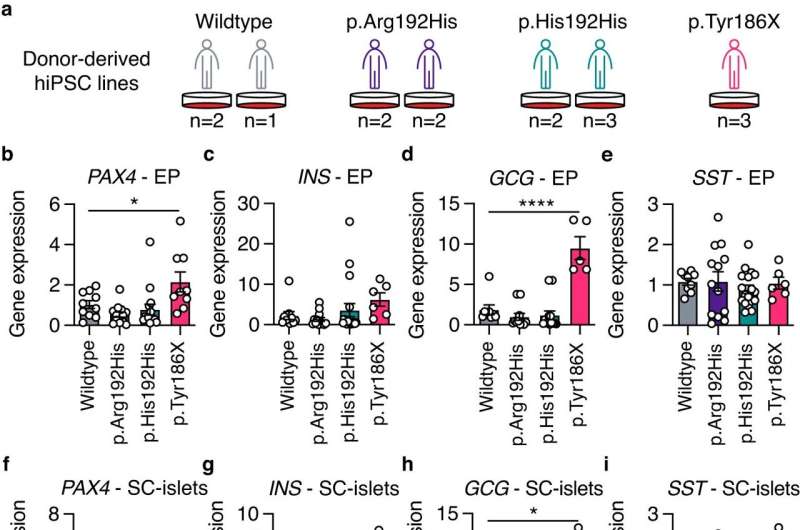It was earlier found {that a} variation within the PAX4 gene particularly predisposes East Asians to the next danger of growing sort 2 diabetes (T2D), growing lifetime danger by as much as 1.8 occasions. A brand new research, now revealed within the journal Nature Communications, reveals for the primary time how an East Asian-specific PAX4 gene variant, R192H, impacts the event and performance of beta cells within the pancreas. These beta cells play a significant function in producing insulin, the hormone that regulates blood sugar ranges and helps stop severe problems in diabetic sufferers.
The insights gained from this research pave the best way for potential therapeutic interventions and personalised approaches in diabetes prevention and administration, marking a big step within the ongoing struggle towards diabetes.
T2D is a power metabolic illness that impacts greater than 500 million people in East Asia. In Singapore, the place individuals of East Asian descent represent the most important ethnic group (roughly 75% of the inhabitants), this PAX4 R192H gene variant is current in 10% of the inhabitants, growing the danger of diabetes particular to those East Asian PAX4 R192H gene carriers.
Led by Dr. Adrian Teo, Senior Principal Scientist at A*STAR’s Institute of Molecular and Cell Biology (IMCB), the worldwide analysis crew consisted of cross-disciplinary scientists from IMCB, Nationwide College of Singapore (NUS), Stanford College and the College of Oxford, in addition to clinicians from Nationwide College Hospital (NUH) and Singapore Normal Hospital (SGH).
The crew used two sorts of cells—human pancreatic cells and donor-derived human induced pluripotent stem cells (hiPSCs)—to check the function of the PAX4 R192H variant within the improvement and performance of pancreatic beta cells. Complete molecular and genetic analyses revealed that the PAX4 R192H variant leads to faulty beta cells with decrease performance, resulting in diminished insulin manufacturing.

Collaborating with researchers from Stanford College and the College of Oxford, the crew demonstrated that correcting the PAX4 R192H variant by means of gene-editing methods can reverse a few of these defects.
Moreover, human scientific research carried out by the NUS, NUH and SGH crew discovered that wholesome people carrying the PAX4 R192H variant secreted considerably much less insulin. This implies that even earlier than the onset of T2D, these people exhibited indicators of diminished beta cell operate, that are essential for insulin manufacturing and blood sugar regulation.
This research gives new perception into the genetic influences on T2D particular to East Asian populations, which may assist advance the event of therapeutic options to struggle diabetes in Singapore. The analysis crew can be wanting into the opportunity of diagnosing and modifying the PAX4 R192H gene variant to revive insulin content material within the beta cells for higher affected person outcomes.
“This research is the primary to disclose how the East Asian-specific PAX4 R192H gene variant impacts human pancreatic cells and contributes to diabetes danger. Collaboration with our clinician companions stays key to the success of this analysis, and these partnerships will support in figuring out higher interventions for metabolic illnesses comparable to diabetes.
“We are actually investigating gene remedy to edit the PAX4 R192H variant to evaluate its potential in mitigating the elevated diabetes danger,” stated Dr. Teo, Senior Principal Scientist, A*STAR’s Institute of Molecular and Cell Biology (IMCB) and senior writer of the research.
“It is actually thrilling so as to add one other piece to our understanding of how diabetes develops in people. This research is especially vital because it stems from an commentary revamped 10 years in the past. It highlights the essential function large-scale genetic research in Asia play in advancing our data of human biology, emphasizing that we can not totally depend on animal research to understand the causes of human illnesses,” stated Prof Tai E. Shyong, Senior Guide, Division of Endocrinology, Division of Medication, NUH, and senior co-author of the research.




